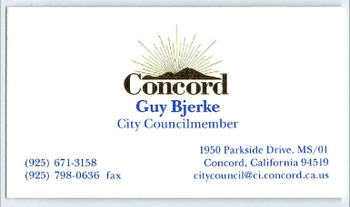Last Monday night the City Council, sitting as the Local Reuse Authority (LRA), held our first hearing on the way to choosing a preferred land use plan for the former Concord Naval Weapons Station.
You can learn about the current proposals and review the Community Advisory Committee’s process by checking out the material available on the Concord Community Reuse Project website.
You can also watch – provided you have about 5 hours – the staff presentation and public testimony from November 17th by visiting the City’s website and viewing the webcast of that meeting.
I appreciated the fact that most of the 50+ speakers at the meeting were positive, offered constructive criticism and/or expressed genuine concerns about the plan’s future impacts. Many were also quite specific – which is also helpful.
A regional stakeholders group provided suggestions on how to improve the Cluster Villages alternative to better integrate educational facilities and potential office parks for green or new technologies.
The Neighborhood Alliance made specific requests like the size of any open space buffer and the permanence of open space designations to protect existing homes that border the Base.
All in all the hearing went well.
One thing, among many, I’m still struggling with though is the concept of “world class”. Creating a “world class” project has been one of the City’s goals and guiding principles from the beginning. The approximately 20 members of the Community Advisory Committee worked diligently to craft their recommendations with the idea that they meet the goals and guiding principles, including the “world class” criteria. What do you think? Is the project “world class”? If not, what would make it “world class”?
The next public meeting on the Reuse Plan is set for 6:30 pm on December 1st at the Concord Senior Center – 2727 Parkside Circle.


